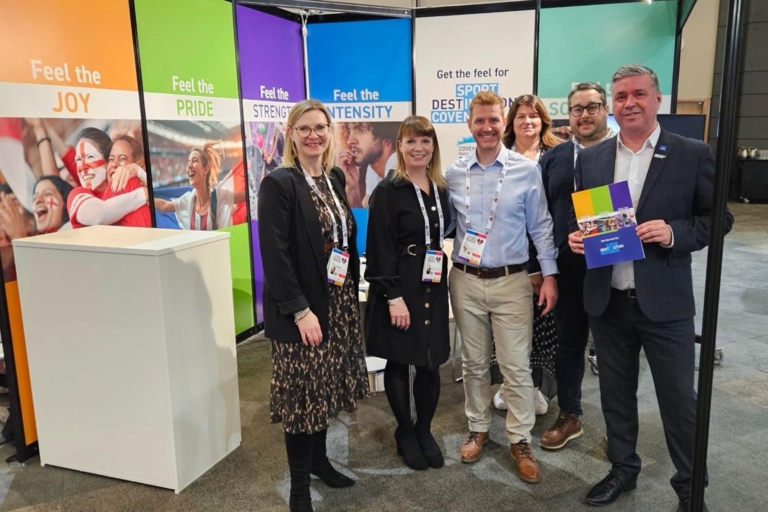Talent and technology
The Business Magazine hosted this roundtable event at business adviser Moore Stephens’ Reading office. Barclays, law firm Shoosmiths, Moore Stephens, and specialist ICT and engineering recruitment consultancy Roc Search sponsored the roundtable. Tim Wickham reports on the discussion.
David Murray, publisher of The Business Magazine, opened proceedings with some thought-provoking statistics. He said surveys show that the fastest growing technology companies focus on growing talent, but that it is predicted there will be 800,000 unfilled vacancies for digital roles by 2020. The Roundtable was a timely opportunity for the panel to share ideas and experiences on how they find and retain top talent.
How do you attract people and is a lack of available talent holding you back?
Chris Sykes at Wokingham-based digital content, technology and innovation provider Volume said: “A lack of talent is hurting us. We have only hired one external person recently. However, our profile in the world of artificial intelligence (AI) is rising and we get people approaching us. Instead, we are reskilling and retraining our own people. But a downside of this is that bigger companies directly approach our staff. Staff retention is helped because our people are motivated by being involved in developing cutting-edge technology.”
IT solutions provider Ultima Business Solutions in Reading has recruited around 120 people in the past year. Gareth Meyer said: “We are finding there is a lack of basic technology skill sets. To address this, we are working closely with universities through graduate and apprenticeship schemes. We have also been talking to HP Enterprise to find out what makes its internships successful. We need the new generation of employees to be more focused on technology rather than sales roles. Another issue is that young people don’t always know what they want to do with their careers.”
Andrew Janes at Bracknell-based communications technology company Redwood Technologies also recruits people mainly on graduate schemes. “We are looking to make more formal links with universities, such as sponsoring trophies. The business has traditionally focused on Russell Group universities for our technical roles, which offers a way of 'rubber stamping' the intellectual capacity of candidates. This does not, however, mean others don’t also have the required talent. We are looking at how we widen that entry criteria without compromising the quality talent the business has brought on board over the years.”
Datchet-headquartered IRIS Software Group, the UK’s largest privately-owned software company, is very active in the job market. “The business has consistently grown by 17% in revenues and EBITDA for 17 consecutive years; we don’t wait for candidates to come to us,” said Stephanie Kelly. “We look at non-traditional areas for untapped talent; for example, mums who have been out of work for 10 years and are uncertain about returning. We can help ease them back into work within a few weeks in a non-committal trial run.”GPS tracking solutions company Trackersense in Reading is at an early stage in its growth. Richard Jennings said: “We are relatively small and tend to recruit engineering graduates straight from university. We’re very flexible on working hours. The new generation of employees wants more out of their workplace so we also show we offer other benefits, like having good environmental and community credentials.”
Understanding what younger people are looking for can be a challenge for employers, noted Phil Kirkham from managed IT solutions company Allied Digital. He said: “We have to be careful about our understanding of what kids want. I don’t think they are that different than we were at their age. Millennials is just a crass term for people who are younger than us and a bit more tech savvy.”
Daniel Brommell at Reading-based Roc Search said the comments resonated with his experience. “Like Chris at Volume, our people get poached. Some come back to us after a few years because they prefer the environment here, and our value proposition. We have had to reinvent the business over the years, so we can answer the typical candidates question ‘What’s in it for me?’. We recruit graduates, mainly from Loughborough and Reading, but it’s hard attracting people. 10 years ago you’d put an advert in the newspapers and receive 500 applicants. Today, you’re more likely to receive only five.”
Innovation Catalyst is based at Reading’s Thames Valley Science Park where it supports start-up and early-stage businesses. Ed Cooper noted that the University of Reading has a team that supports companies looking for graduates. “Successful businesses involved with the university’s enterprise centre are often looking for graduates who will be starting their first jobs, rather than having worked for anyone else.”
Right people, right roles
How hard is it to attract graduates, especially compared with London-based businesses? And does success in recruitment depend on the type of work you are offering? Brommell said: “We have clients who are changing to the latest technology and they are finding it difficult to recruit people to work on their legacy equipment because they don’t want to work on older technology.”
Volume gets round the challenge of finding the right external candidates by developing its own people. Sykes said: “We encourage self-investment in careers and support employees with training. With job roles on offer like robot handler, Volume is attractive to graduates. We also have an academy and work with the University of Reading and local schools to attract talent.”
IRIS makes sure it learns from the experience of recruiting each new employee. “We have a mix of graduates and apprentices. Of course we aim to get the best candidate for the job, but it's important for us to continue training and upskilling as their role progresses. We are also proactive in our process by looking back at employees who have done well to see what we did to recruit them so in future we can attract people with similar talents,” said Kelly.
Coded message
The panel agreed that schools could do more to teach computing coding and other skills needed by employers.
Janes said: “There has been some change at schools in recent years, with developments like Raspberry Pi and coding through computer games.”
Lee Atkinson said Barclays runs coding skills workshops at schools and in branch. “We do this to help youngsters learn the basics of computer coding, as the introduction of coding into the national curriculum has left some parents unable to help out on the new favourite school subject. We also run a ‘bolder’ apprenticeship scheme for more mature people and those who have left the banking profession and want to return. We receive numerous applications for graduate-level jobs, but we want to attract a diverse workforce across the board,” he said. Recent Barclays research How employable is the UK?, identified that nearly six in 10 adults failed to demonstrate the core employability skills needed for the future world of work. To help address this problem Barclays is extending its LifeSkills programme to all ages aiming to help 10 million people build their employability skills by 2022.
Cooper didn’t mince his words on the scale of the coding problem. “The lack of teaching on coding in school is pitiful,” he said. “Business needs to step in, for example, with corporates getting company staff to teach in schools so kids get an understanding of coding.”
Jennings agreed. “At school, the most kids usually do is work in Word or PowerPoint. It can put them off careers in technology. I’m involved in projects at schools where children have the chance to reach out to the community and work with local businesses, but this is done outside the school curriculum.”
As well as a lack of teaching in subjects like computer coding, the panel was concerned that students don’t get enough information about job prospects in technology roles. David Jenkins at Roc Search asked: “How well do schools advertise the benefits of taking a technology degree? More could be done in linking study to job prospects, especially in new technologies.”
Kelly thought bright students probably look at all the job opportunities available. “They’ll choose universities and degrees in subjects like computer science, as they tend to be the best paid jobs.”
Apprenticeships: you’re hired
Apprenticeships can offer an alternative recruitment route to graduate programmes.
Daniel Henwood at Moore Stephens said: “We’re fans of apprentices, although we also take on a huge number of graduates. Some of our best people have come straight from school. They have taken a brave, mature decision early on in their careers and we have provided the right training, development and support. Diversity at work is about having a full mix of people who have a broad range of skills.”
Meyer said Ultima is equally enthusiastic about apprentices: “Around 10% of our growth in employee numbers last year was through our apprenticeship scheme. This year, we are taking on apprentices in technology as well as administration roles. We screen people very carefully and generally focus on Reading-based employees.”
Planning ahead
How many years ahead do businesses plan their recruitment activities?
Sykes commented: “That’s a difficult one. You can’t plan too far ahead as the technology world is so volatile. At the same time, as exciting as technology developments are, we also have legacy technology and need to focus on making sure we are reskilling and retaining our people to run it.”
Jennings noted that planning in advance is not an exact science. “Trackersense’s future direction is based on our people strategy. That said, four months ago the strategy was a bit different from today and will probably have to change again six months down the line. Customer requirements are always changing. We look to recruit people who we think will be as flexible as we need to be. They have to be as entrepreneurial as I am. Having a five-year recruitment plan is not right for our type of business.”
IRIS “stays ahead of the curve” by maintaining a large pool of CVs from prospective candidates in a tracking system. “We generally plan a year ahead. We look at the products we are developing and ask our leaders for their needs. We can then anticipate demand and actively recruit,” said Kelly. “We also spend time on succession planning. Every critical job position has someone who will be ready to step into the role in two- or five-years’ time.”
The panel discussed the impact of increased job automation and AI on recruitment. Henwood pointed out that it depends on the job role. “Automation should help us move away from offering process-driven tasks and that should make roles more interesting and attract people to us,” he said.
Offshore options
Volume has a team of 22 software engineers in Sri Lanka. “The country has a good education system and people have a brilliant work ethic. Working for a UK business brings kudos and we treat them well,” said Sykes. “We’re looking to scale up by bringing in more Sri Lankan engineers.”
Kirkham said: “Allied Digital is six months old. The only way we have been able to get the skills we need quickly enough has been by looking overseas. About 50% of our people are in India and Serbia. We need the skills and the cost advantage of having a really good pool of talent. It’s hard to find the right people in the UK, who you can train and then lose to a competitor. But it can also be hard getting people working offshore to feel part of your team.”
Janes commented: “We’ve been UK centric as an employer and had intended to keep it that way. However, as we’re now growing internationally we have customers in various time zones and a trigger to change has been to ‘follow the sun’ for providing technical support. We need to support customers across all time zones so having people in those time zones makes sense. It also allows us to find talented technical roles in more places, further widening our talent pool. You have to ask where are the people you need actually found, not just what do we need and blindly try to find it in your existing locations? At my previous employers, we built teams in Serbia and Bulgaria as they were up and coming technical locations, but even over a handful of years it became harder to recruit from there as their reputations grew for producing great technical talent. The challenge then comes down to finding a matching cultural fit – are you getting the right people who match your business needs and can be embedded into your business culture?”
Sykes added: “We have a live video wall that’s permanently on showing staff working in Wokingham, Plymouth, Sri Lanka and San Jose. That way, they don't seem thousands of miles away. Young British technology engineers and Sri Lankan engineers get on well. In fact, two of them recently got married.”
Jonathan Naylor at Shoosmiths thought: “Getting the right people for your culture is crucial. If you are going to deliver seamless service, where customers see no difference, close communication is essential wherever your staff are based.”
Moving employees from one location to another can be a challenge, said Naylor: “When you're offshore, it can be difficult getting people in and out of certain jurisdictions easily. I think the question of freedom of movement for qualified and experienced people will be a key issue in the next few years.”
Jenkins agreed that movement was a growing recruitment issue for multinational businesses. “Companies are having to go further and further to find the talent they need. We have clients who use developers in three time zones.”
Demand for offshore employees is evident from start-ups onwards, observed Cooper: “We are seeing many early-stage businesses starting with a global perspective. They already have international contacts and operate globally.”
Acquisition trail
IRIS Software Group uses business acquisitions to bring on board skilled and experienced teams.
Kelly said: “Our acquisitions bring the most amazing skills to the business. I look at the DNA of each acquired organisation to identify where they excel and use those skills across the whole business. The CEOs who join us have very entrepreneurial mindsets, so we utilise their passion and tenacity throughout IRIS.”
“The bank will work with companies that are developing new fintech platforms for example. We might then take a stake in that business so we can leapfrog over any legacy constraints we may have with our own systems.” said Atkinson.
Brand power
Is the strength and image of your brand important in attracting talent?
Sykes commented: “Our four core values are massively important to us. We bring in performance coaches and motivational speakers so we have a strong reference framework around our values for employees.”
Ultima has maintained its brand values for nearly three decades. “Our chairman used these values to build the business from scratch. Getting the right employees is key to maintaining our values, especially as our organisation transforms,” said Meyer. “We develop new areas of business but never change our values. We wrap our business around our brand values.”
Diversity agenda
The panel discussed the importance of diversity and gender balance in their workforces.
Kelly said IRIS was ahead of the industry average in this respect. “We have good levels of diversity compared to the rest of our industry. About 40% of our employees are women compared with a technology industry average of about 17%. Initiatives like our ‘back to work’ programme help with diversity,” she said.
The priority for Roc Search is to match the right people to the required roles. “We look for the right skills in the right person, whoever they are. Roc Search isn’t male driven and the men/women split is about 50/50,” said Brommell.
Individuals in companies, especially men, need to put in more effort to promote greater diversity thought Janes. “To draw an analogy, everyone understands the benefits of being fit and healthy to their wellbeing, and that you need to make an effort to be fit. Those things don’t happen by accident and by just thinking that being fit and healthy is a good thing. Similarly, we all know that balanced, diverse organisations lead to successful businesses. You have to put in the effort to get there. I’m conscious that I’m a white, middle-class male in a senior position, so I’m not helping the situation unless I make more personal effort to enable change. For me, that means doing things like not writing job adverts in my own ‘language’ that will probably only attract people like me. Men should be making more of an effort on diversity. After all, men have had it their own way for so long that’s only right.”
Barclays is committed to offering dynamic working to broaden diversity. Atkinson said: “Our flexible working approach has seen staff satisfaction levels go up, productivity increase and improvements in employee retention – it’s been a win/win for all.”
For Sykes, the way he has built up Volume means there are fewer barriers to achieving greater diversity. He said: “About 45% of our employees are women and around 70% of our AI specialists are women. We have ethnic diversity through our colleagues in Sri Lanka and we have LGBT representation. We haven’t consciously gone out to achieve diversity – we are naturally a diverse organisation by living and portraying our core values.”
Tech attractions
Are new areas of technology, like big data, attracting talent?
Brommell thought they were, but it was also exacerbating the problem of skills shortages. He said: “Cloud-based technology is big at the moment but there is a permanent shortage across the world of software developers. One of our biggest clients is based in India and works in Europe. It is finding it hard to get Indian employees to work over here, while in Europe even junior developers tend to work as contractors on high daily rates.”
The fight to win the best candidates could be putting companies at risk, warned Jenkins: “There is pressure on companies to recruit quickly or they could lose the good candidates. That gives them little time to set up interviews for permanent positions to make sure the candidate is the right fit. It can be very damaging to a business if it recruits the wrong person.”
Are you positive about 2019?
Steve Medley at Barclays wrapped up the roundtable with short summary: “The message I’m hearing here and in the business community generally is that there is a real challenge of capturing and retaining new talent. Brexit is also providing uncertainty. However, companies with strong cultures and brands have the credentials to attract potential candidates. It’s then a question of how do you get your message out to potential recruits and how do you differentiate your business from other companies looking for the same talent?”
The inevitable question on Brexit drew a resigned, but generally determined response. Medley said: “Businesses have to keep on doing what they are doing”. Brommell agreed: “If you’re in Europe then the situation is obviously still very unsure. For the rest of us it has to be business as usual.”
Participants
Lee Atkinson: Relationship director, Thames Valley corporate team, Barclays
Daniel Brommell: Senior business manager, Roc Search
Ed Cooper: Director, Innovation Catalyst
Daniel Henwood: Partner, Moore Stephens
Andrew Janes: Chief people officer, Redwood Technologies
David Jenkins: Business manager, Roc Search
Richard Jennings: CEO, Trackersense
Stephanie Kelly: Chief people officer, IRIS Software Group
Phil Kirkham: Managing director, Allied Digital
Gareth Meyer: Head of sales, Ultima Business Solutions
Steve Medley: Relationship director, Barclays
Jonathan Naylor: Partner, Shoosmiths
Chris Sykes: Managing director, Volume
David Murray: Founder and publisher of The Business Magazine, chaired the discussion












